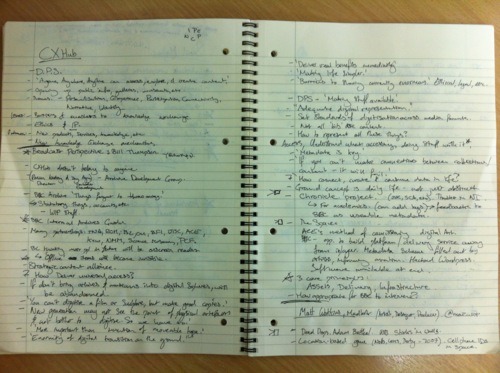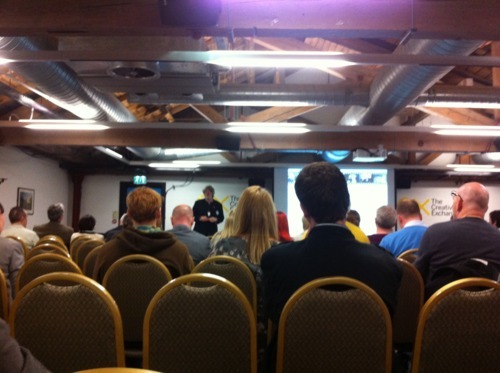On Wednesday I went to the Creative Exchange launchpad event at the Museum of Science and Industry in Manchester. I’ll start by saying that MOSI was a great venue, and looked like a really interesting museum – I was quite disappointed that I didn’t have time to look round it. The event was, in a word, good. I made eight pages of scrawled notes, and I only wrote down things that were interesting.

If you’re not aware of the Creative Exchange, it’s an initiative that aims to “create new products, experiences and business opportunities which empower anyone, anywhere to access, explore and create with the newly accessible collections of media, public information and data trails which form the digital public space”.
It’s a big idea, and one that I feel is very worthwhile. It’s also something that’s very relevant to our work at TIME/IMAGE.
The event had a host of interesting speakers (find a list here), and I’ll very briefly pick up on some of what was said here, and maybe expand on key points another time. If anyone is interested in a more detailed breakdown of what was talked about, let me know.

Bill Thompson’s talk on ‘Broadcast Perspective’ regarding the digital public space was the most directly relevant to my interests. Amongst many other thought-provoking topics, he talked about a digital future where items that aren’t online in some format will become ‘invisible’, and how the British Library is considering a future where most people will read through screens. He claimed that this current digital movement is at least as important as the invention of moveable type – a sentiment later echoed by Neville Brody. The importance of standardised, clean metadata was another key point raised, as well as the value of connected information and access. I think I pretty much agreed with everything he said, to be honest.
Matt Watkins spoke from the viewpoint of games designer. Topics I particularly picked up on were the over-personalisation of our online experiences and how this removes chance encounters and that the public space (digital or physical) is about strangers, not friends – despite what Facebook may tell us. He also felt that “[there is] no longer a very small amount of people creating stuff… [digital] tools allow more people to be creative”. I hadn’t considered that before, but it’s a good observation.
Richard Harper’s talk was heavy on philosophy, and so largely went over my head. Nonetheless, I agreed with his argument that you have to interpret the past as a result of its very nature, and he made an interesting comment about space, “Place has vitality, but the internet was supposed to make location not matter”.
After a coffee-break, Neville Brody talked about the digital public space as “a new Renaissance”. I was tempted to break out the highlighter for the line, “This is not a digital revolution… but a knowledge revolution.” Yes, bravo. I’ll write more about that topic in the near future. Another strong idea was that, “dynamic, responsive, inter-connected data… is going to change everything.” I could go on about his talk, actually, but I’ll stop with the notion that as the digital public space develops, “memory and identity becomes key.”
Jo Twist’s enthusiastic talk about the gaming industry appealed to my personal interests as a geek, but I couldn’t relate much of it to my professional interests. Still, it was enjoyable, and nice to see gaming represented at the event – I do feel that it has an increasing role in our digital experiences. I also agree with her comment that more people need to learn to programme. I certainly wish that I knew how to programme – it feels like a huge gap in my knowledge.
The talk by Clément Renaud on hacking was decidedly out of my sphere, but I appreciated his view that “better knowledge equals better society”, and the question of who owns knowledge.
The final speaker was Mike Ryan, who gave a fairly terrifying talk that centred around digital privacy, how we apparently don’t have any, and why this is bad. Following the premise that data is valuable to companies, he went on to inform us that thumb-sized CCTV drones exist, that Minority Report-style adverts will exist in five years, and that Menwith Hill is possibly listening to all my conversation online. That’s what I heard, anyway. I confess that I got distracted towards the end, plotting short story in a world where there’s CCTV everywhere.
In conclusion, there was a lot of food for thought and I’m going to be digesting it for some time. In the meantime, my compliments to the organisers on such an well-organised and interesting event. I’m confident that a lot of good ideas will come out the Creative Exchange, if this was anything to go by.